Tuesday, April 06, 2004
[325] Of Tigris-Euphrates marshes and Iraq
[325] Of Tigris-Euphrates marshes and Iraq
nb: all mays and mights in Italic were added well after after this entry was published. The words are added after a discussion with a friend. Whatever the addition, I don't support the war but I accept the positive externality the war has produced on the environment of the marshes.
I may have changed my mind about Iraq. The more I think of it, the more appropriate the war seems to be.
Saddam Hussein is no angel. He killed his own family. He murdered his own people. He tortured them. He enriched himself at the expense of the Iraqis. He lived lavishly like the ancient Egyptian pharaohs while some of the Iraqi minorities struggled to meet ends.
Saying so, it doesn’t mean I support Bush. If I may, he and his administration are among the worst liars I have ever heard or seen in my life. He even dared lied to the world at the United Nations Security Council.
Yet, the war did and does benefit the Iraqi. Although hatred against the American troops is running high in Iraq, the freedom to express that hate was simply a nonexistence during Saddam Hussein’s regime. Under that despot, the Shiite couldn’t possibly take their voice down to the street. They couldn’t perform their full religious responsibility freely and openly. The US and its allies, regardless of the real underlying reason for the invasion, changed that for the better.
But what really might bent my opinion was not his treatment of the Kurds or of the Shiite. It was not the way he kicked freedom right at the stomach. Though I believe freedom, democracy and human rights are important, in this case, they are the secondary reasons on why I may switch camp.
The prime mover that altered my view, given that I am a green, was the way he treated the Earth.
During the days after Saddam Hussein’s defeat after the invasion of Kuwait, a few rebelled against him thinking that Saddam had been weakened. Unfortunately for the rebels, the Baath-controlled government was not as weak as they had perceived and the rebellion was crushed swiftly. Consequently, some of the rebels seek refuge in the marshes near Tigris and Euphrates.
In his quest to quell the rebellion further and to squeeze the rebel out, Saddam oversaw a major draining of the marshes. The Tigris and Euphrates were blocked from entering the marshes. To justify this action, Saddam cited agricultural reason for the water diversion. Regardless of what Saddam said, little agricultural program was carried out.
The diversion in the end not only managed to suppress the rebellion, it also managed to be one of the biggest ecological destructions in modern history. Almost the entire marshes, a prominent natural feature of Mesopotamian geography that once covered as large as 20 000 km² are lost under Saddam’s regime. According to the United Nations Environmental Program (UNEP), as much as 90% of the marshes is gone. All other species that are dependent on the marshes are probably gone too.
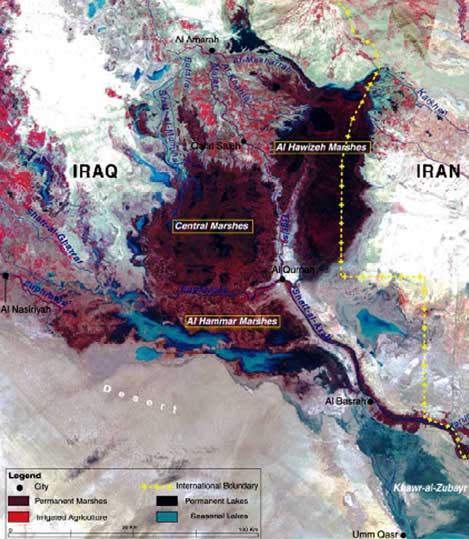
A 1973 satellite photo taken from UNEP's Desk Study on the Environment in Iraq. The map shows the marshes before Saddam's action. I've editted it to make it smaller.
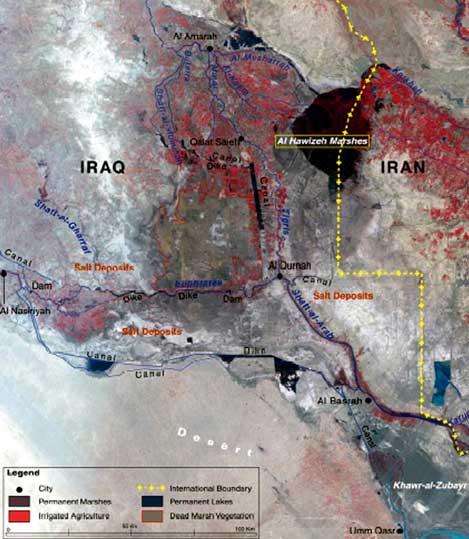
The same area in 2000, taken from the same study.
Apart from that, the area is also suffering a severe salination. Furthermore, if nothing is done in time, the area faces extreme desertification threat.
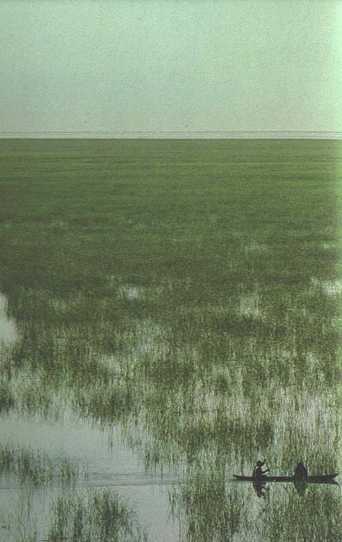
The marsh former glory. Reproduced with permission from Laputan Logic.
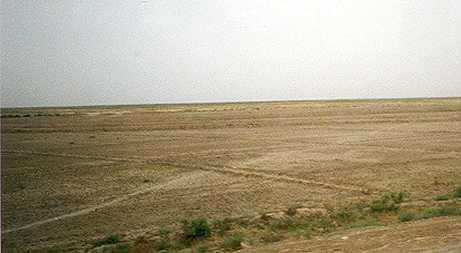
The marsh generally now. Reproduced with permission from Laputan Logic. Photo by Daniel B. Grünberg.
The disappearance of the marshes is not just a tragedy environmentally. It is a cultural tragedy too. The Marsh Arabs or the Ma'dan in Arabic, have been the inhabitants of the marshes for more than 5 000 years. Their ancestors had possibly witness the rise and fall of the great Mesopotamian ancient civilizations.
Before the drainage of the marshes, according to Wikipedia, it was estimated that almost half a millions Marsh Arabs had lived in the marshes. Right now, it is reported that merely 10 000 still linger hopelessly there. A culture that has survived for 5 000 years is being threatened to the edge of extinction in less than three decades.
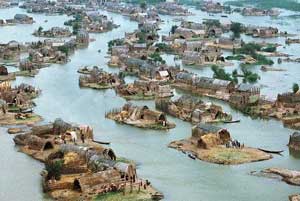
A Ma'dan village in 1974. Reproduced with permission from Laputan Logic. Photo by Nik Wheeler.
However, this was not the first time the Tigris and the Euphrates were diverted at the expense of the marshes. During the Iran-Iraq War that lasted for approximately eight years from 1980 to 1988, the Tigris and Euphrates were diverted in order to slow down the Iranian counterattack. In spite of this, the effect from the Iran-Iraq War was minimal.
Currently, the occupying forces are slowly diverting the water from the ancient Tigris and Euphrates back in the marshes. If the so-called Coalition of the Willing hadn’t invaded Iraq, such action wouldn’t be possible. As much as I hate to say this, as much as the war is unjustified and based on lies and deceits, restoration of the marshes is possible because of the invasion. With the cooperation given by the occupying forces, UNEP has also conducted several studies on the current situation of the marsh and thus allowing conservation effort to start.
Yet, whether damage is repairable or not, we are left at the mercy of time. I truly hope it is repairable. I hope to see, or at least read somewhere in future publications about the recovery of the marshes. I hope to see first hand or through third person source, flying and singing birds conquering the blue sky of the marshes, for the water buffaloes to swim in line, for kids to again sing among the marshes without worry.
I, from now on - no matter how unjustified the war was, whether or not WMD was there in the first place - support the war. I might be too late for more than a year but thank God, somebody else didn’t make the same mistake.
Note - Click here for Laputan Logic on the Marsh Arab
I may have changed my mind about Iraq. The more I think of it, the more appropriate the war seems to be.
Saddam Hussein is no angel. He killed his own family. He murdered his own people. He tortured them. He enriched himself at the expense of the Iraqis. He lived lavishly like the ancient Egyptian pharaohs while some of the Iraqi minorities struggled to meet ends.
Saying so, it doesn’t mean I support Bush. If I may, he and his administration are among the worst liars I have ever heard or seen in my life. He even dared lied to the world at the United Nations Security Council.
Yet, the war did and does benefit the Iraqi. Although hatred against the American troops is running high in Iraq, the freedom to express that hate was simply a nonexistence during Saddam Hussein’s regime. Under that despot, the Shiite couldn’t possibly take their voice down to the street. They couldn’t perform their full religious responsibility freely and openly. The US and its allies, regardless of the real underlying reason for the invasion, changed that for the better.
But what really might bent my opinion was not his treatment of the Kurds or of the Shiite. It was not the way he kicked freedom right at the stomach. Though I believe freedom, democracy and human rights are important, in this case, they are the secondary reasons on why I may switch camp.
The prime mover that altered my view, given that I am a green, was the way he treated the Earth.
During the days after Saddam Hussein’s defeat after the invasion of Kuwait, a few rebelled against him thinking that Saddam had been weakened. Unfortunately for the rebels, the Baath-controlled government was not as weak as they had perceived and the rebellion was crushed swiftly. Consequently, some of the rebels seek refuge in the marshes near Tigris and Euphrates.
In his quest to quell the rebellion further and to squeeze the rebel out, Saddam oversaw a major draining of the marshes. The Tigris and Euphrates were blocked from entering the marshes. To justify this action, Saddam cited agricultural reason for the water diversion. Regardless of what Saddam said, little agricultural program was carried out.
The diversion in the end not only managed to suppress the rebellion, it also managed to be one of the biggest ecological destructions in modern history. Almost the entire marshes, a prominent natural feature of Mesopotamian geography that once covered as large as 20 000 km² are lost under Saddam’s regime. According to the United Nations Environmental Program (UNEP), as much as 90% of the marshes is gone. All other species that are dependent on the marshes are probably gone too.

A 1973 satellite photo taken from UNEP's Desk Study on the Environment in Iraq. The map shows the marshes before Saddam's action. I've editted it to make it smaller.

The same area in 2000, taken from the same study.
Apart from that, the area is also suffering a severe salination. Furthermore, if nothing is done in time, the area faces extreme desertification threat.

The marsh former glory. Reproduced with permission from Laputan Logic.

The marsh generally now. Reproduced with permission from Laputan Logic. Photo by Daniel B. Grünberg.
The disappearance of the marshes is not just a tragedy environmentally. It is a cultural tragedy too. The Marsh Arabs or the Ma'dan in Arabic, have been the inhabitants of the marshes for more than 5 000 years. Their ancestors had possibly witness the rise and fall of the great Mesopotamian ancient civilizations.
Before the drainage of the marshes, according to Wikipedia, it was estimated that almost half a millions Marsh Arabs had lived in the marshes. Right now, it is reported that merely 10 000 still linger hopelessly there. A culture that has survived for 5 000 years is being threatened to the edge of extinction in less than three decades.

A Ma'dan village in 1974. Reproduced with permission from Laputan Logic. Photo by Nik Wheeler.
However, this was not the first time the Tigris and the Euphrates were diverted at the expense of the marshes. During the Iran-Iraq War that lasted for approximately eight years from 1980 to 1988, the Tigris and Euphrates were diverted in order to slow down the Iranian counterattack. In spite of this, the effect from the Iran-Iraq War was minimal.
Currently, the occupying forces are slowly diverting the water from the ancient Tigris and Euphrates back in the marshes. If the so-called Coalition of the Willing hadn’t invaded Iraq, such action wouldn’t be possible. As much as I hate to say this, as much as the war is unjustified and based on lies and deceits, restoration of the marshes is possible because of the invasion. With the cooperation given by the occupying forces, UNEP has also conducted several studies on the current situation of the marsh and thus allowing conservation effort to start.
Yet, whether damage is repairable or not, we are left at the mercy of time. I truly hope it is repairable. I hope to see, or at least read somewhere in future publications about the recovery of the marshes. I hope to see first hand or through third person source, flying and singing birds conquering the blue sky of the marshes, for the water buffaloes to swim in line, for kids to again sing among the marshes without worry.
I, from now on - no matter how unjustified the war was, whether or not WMD was there in the first place - support the war. I might be too late for more than a year but thank God, somebody else didn’t make the same mistake.
Note - Click here for Laputan Logic on the Marsh Arab























